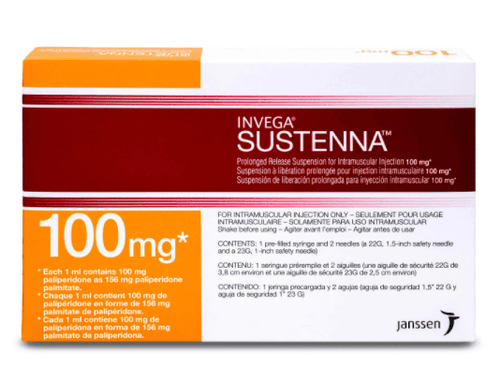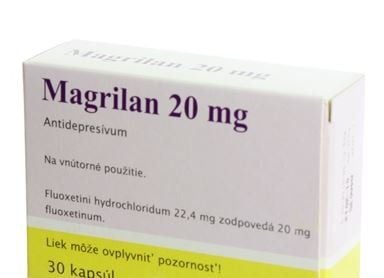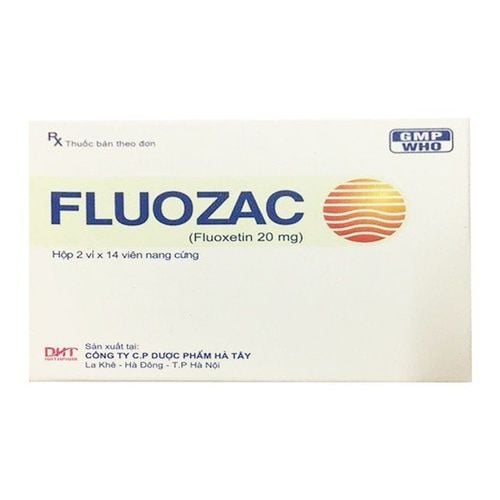This is an automatically translated article.
Mawel is classified as a psychotropic drug, having the main effect in the treatment of disorders such as depression, obsessive-compulsive disorder - obsessive-compulsive disorder. With the main ingredient is Fluoxetin, the dose and how to use Mawel as well as the notes when using it will be in the article below.
1. What is Mawel?
Mawel is classified as a psychoactive drug, used to treat depression, bipolar disorder, and neurological diseases.Mawel drug has the main active ingredient is Fluoxetin, is made in the form of capsules and has a content of Fluoxetin in each tablet is 20mg.
2. Uses of Mawel
The main active ingredient is fluoxetin in Mawel in the form of fluoxetine hydrochloride, a bicyclic antidepressant that selectively inhibits serotonin reuptake by neurons. The duration of action of this active ingredient is quite slow, the full therapeutic effect lasts from 3-5 weeks. Therefore, in cases of severe depression, Mawel is not effective immediately.Mawel is well absorbed from the gastrointestinal tract when the patient takes the drug. The oral bioavailability of Mawel is estimated at about 95%, which is also a figure representing Mawel drug plasma binding.
The half-life of fluoxetin in plasma after a single dose is 1-3 days, this will be 7-15 days in patients with repeated doses and will be longer in those with alcoholic cirrhosis. Studies have shown that mild to moderate renal impairment does not change the half-life of the drug in the body.
3. Indications for taking Mawel
Mawel is indicated in the following cases:
People with depression. People with panic syndrome. People with binge eating syndrome. People with obsessive-compulsive disorder.
4. Contraindications to taking Mawel
Mawel is contraindicated in the following cases:
Patients are sensitive to the Fluoxetin component of the drug. Patients with severe renal impairment and with creatinine clearance less than 10ml/min. Patients taking medications with monoamine oxidase (MAO) inhibitors. The patient has a history of epilepsy.
5. Dosage and how to use Mawel
How to use: Mawel medicine is in the form of capsules to be used orally.
Dosage of Mawel:
Dosage in the treatment of depression:
The starting dose is 20mg/day, taken once in the morning. In some cases, a lower dose can be used (ie 20mg but only once every 2 or 3 days). After the first dose, the maintenance dose is varied according to the individual drug response. Dosage in the treatment of panic syndrome:
The starting dose is 10mg/day, taken once in the morning. After 1 week of taking 10mg/day, the dose can be increased to 20mg/day. If the patient's condition does not improve within a few weeks of treatment, the dose can be increased to 60 mg/day. Dosage in the treatment of bulimia:
Standard dosage is 60mg/day, can be taken once in the morning or divided into several times a day. Dosage in the treatment of obsessive-compulsive syndrome:
Starting dose of 20mg/day. It takes a few weeks for the starting dose to begin to respond. Doses over 20mg must be divided into 2 doses a day, including morning and afternoon. In some cases, the dose can be increased to 80mg/day, but it also takes 4-6 weeks for the drug to achieve therapeutic results with the previously used dose. For the elderly and people with impaired liver function: It is necessary to reduce the dose and reduce the rate of dose increase from the beginning:. Elderly patients usually start at 10 mg/day and should not exceed a dose of 60 mg/day.
6. Side effects of Mawel
At the beginning of treatment, patients may experience restlessness, anxiety and sometimes difficulty sleeping in some cases, even nausea. Common side effects are generalized fatigue, sweating, impotence, loss of sexual function in men, decreased sex drive in both sexes, diarrhea, loss of appetite, skin rash. Uncommon side effects include headache, urticaria, vomiting, gastrointestinal disturbances, urinary retention, and bronchospasm leading to asthma-like reactions. Rare adverse events include cardiac arrhythmias, vasculitis, extrapyramidal reactions, dyskinesias, Parkinson's syndrome, serotonin syndrome, gynecomastia, hyperprolactinemia, pustules, lupus erythematosus , hepatitis, cholestatic jaundice, hyponatremia, pulmonary fibrosis and laryngeal edema.
7. Notes when using Mawel
Use caution when reducing the dose for patients with liver disease or severe liver function reduction. Use with caution in children or adolescents under 18 years of age as side effects have been associated with suicidal behavior (suicidal thoughts or suicidal thoughts). Mawel may cause dizziness or headache, so avoid getting up suddenly from a lying or sitting position after taking the medicine. Besides, with side effects such as dizziness or headache, Mawel is also recommended to be used with caution when driving and operating machinery. Mawel may cause a sudden drop in blood sugar in patients with diabetes. Mawel should be used with caution in patients with a history of epilepsy, as fluoxetine may lower the seizure threshold. Mawel should not be used by women who are pregnant or breastfeeding. Mawel is a prescription medication used in the treatment of depression and compulsive disorder. Mawel has many serious side effects, so patients need to use the drug under the supervision and monitoring of relatives or specialists.













